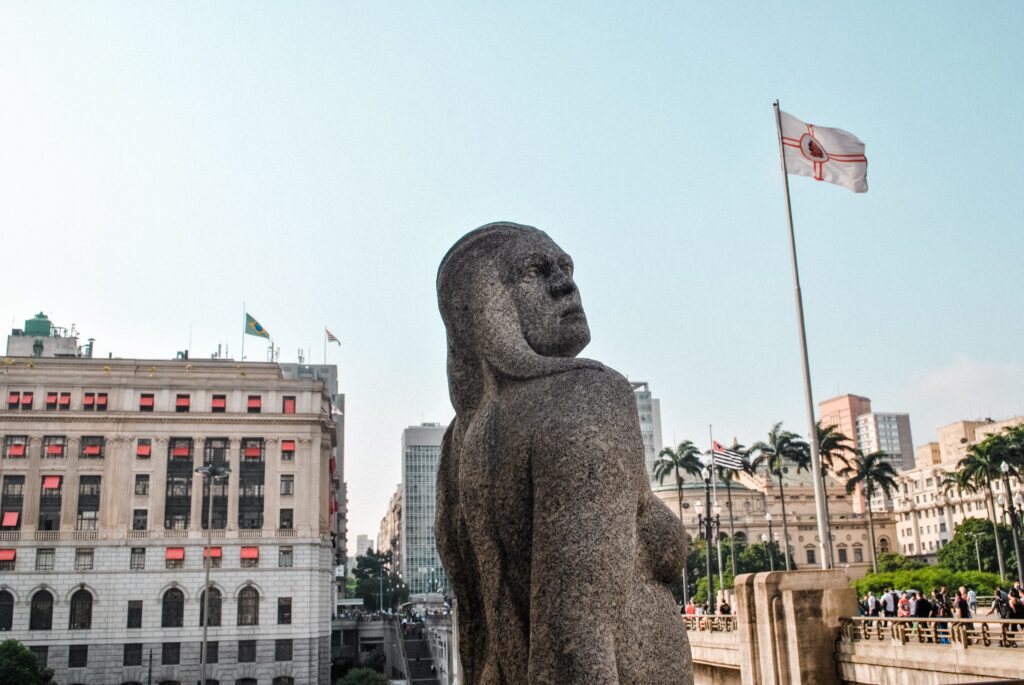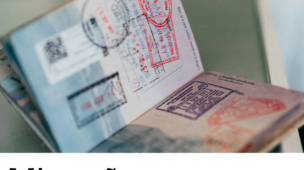Brazil is experiencing a new migratory scenario. The number of immigrants registered by the Federal Police has been increasing steadily every year. Consequently, the right to acquire Brazilian nationality has gained a high degree of public interest.
In Brazil, unlike most European countries, the rules for granting nationality are not provided for by law or decree: the right to Brazilian nationality is listed in the Federal Constitution itself.
Therefore, an individual can either acquire original Brazilian nationality (nacionalidade brasileira originária), by which he/she is considered a Brazilian-born citizen (brasileiro nato), or derived Brazilian nationality, by which he/she is considered a naturalized Brazilian citizen (brasileiro naturalizado).
1. Can a foreign citizen acquire Brazilian nationality?
Yes. The 1988 Constitution of the Federative Republic of Brazil provides that those born in Brazil are native Brazilian citizens, even if of foreign parents, provided they are not at the service of their country of origin.
Thus, a child born to foreign parents in Brazil will be considered a native Brazilian citizen.
This is possible because in Brazil the system that governs nationality is Jus Soli, “right of the soil”. This means that original nationality is acquired according to the territory where the individual was born.
As a result, every child born in Brazil is considered an original Brazilian national, even when its parents are foreigners. However, if those parents are at the service of a foreign country, the Jus Soli rule does not apply.
In this respect, it is worth mentioning that the Brazilian Constitution provides that the law cannot establish a distinction between natural and naturalized Brazilians, except for the access to some political offices.
For instance, it establishes that the position of President and Vice President of the Republic, among others, are reserved to those born in Brazil.
In short, the Constitution of the Federative Republic of Brazil is the only norm that indicates who can acquire Brazilian nationality, be it original or derived.
2. How to proceed when a foreign child is born in Brazil?
In bureaucratic terms, there is no different rule for children born in Brazil to Brazilian or foreign parents. In both cases, the parents must present their identification document, with picture ID. Married parents must also show their wedding certificate.
Regarding foreign parents, the identification document that must be submitted is the passport or identity card of the foreign father and/or mother.
Every child born in Brazil is entitled to a Birth Registry, which is free of charge and guaranteed by law. The child must be registered immediately after birth.
To this end, the maternity will provide a Declaration of Live Birth (Declaração de Nascido Vivo), which must be presented at the Civil Registry (Cartório de Registro Civil). If the child was not born in a hospital, its parents must register it in the company of two witnesses who confirm both pregnancy and childbirth.
The Brazilian Federal Constitution equally provides the right to Brazilian nationality for those born abroad to a Brazilian father or mother, provided that they have been registered in a competent Brazilian office or reside in Brazil and opt for Brazilian nationality, at any time after reaching the age of majority.
Similarly, those born abroad to a Brazilian father or mother are considered Brazilians, provided that at least one of them is at the service of Brazil.
Likewise, the Federal Constitution provides for the granting of Brazilian nationality, by naturalization, to foreign citizens who declare their will to obtain it, as long as they abide by the requirements set forth in the Constitution.
The Constitution establishes diverse groups of foreigners that may apply for Brazilian nationality:
- Foreign nationals from Portuguese-speaking countries
- Foreign nationals of any nationality
- Equality statute for Portuguese nationals

3. Brazilian nationality through naturalization
Foreign nationals from Portuguese-speaking countries need to have carried a residence permit for one year without interruption and are required to be morally apt.
Please bear in mind that this residence must be regular. This means that you need to be in the due possession of a foreigner identification card (cédula de identificação de estrangeiro).
For example, many foreigners mistakenly believe that, in order to apply for Brazilian nationality, it suffices that they simply reside in Brazil (having a proof of address). However, this is not the case, as it is necessary to reside legally in Brazil (being documented).
Foreigners of any nationality are required to maintain their residence regularly for more than 15 (fifteen) years without interruption and without criminal convictions.
4. Equality statute through the Friendship Treaty
Portuguese nationals with a permanent residence in Brazil are entitled to the rights inherent to Brazilians, if there is reciprocity in favor of the latter.
The right to equal treatment is a reciprocity agreement for civil and political rights that was mutually signed between Brazil and Portugal.
In Brazilian domestic law, reciprocity was initially foreseen in the old Foreigner Statute, and, currently, its legal provisions are stipulated under the Migration Law.
In other words, the Migration Law Regulation provides for equal civil and political rights for Portuguese citizens in Brazil. Likewise, in Portugal the same rights are provided for Brazilian citizens residing there.
In this sense, the Portuguese are the only non-Brazilian nationals that are allowed to exercise Brazilian citizenship. This is a rare exception to the nationality principle, which includes Portuguese nationals provided that a reciprocal treatment of Brazilians is in place.
5. Is Brazilian nationality through marriage possible?
Many people have doubts and question whether it is possible to apply for Brazilian nationality by marriage or by having a child which is Brazilian citizen.
The answer to this question is no: marrying a Brazilian citizen or having a child of Brazilian nationality does not give you the right to acquire Brazilian nationality.
In this respect, in another article on this blog, Brazilian Nationality through Marriage: is it possible? Link, we clarify that contracting marriage with a Brazilian spouse alone does not support the request for nationality.
This is because the Federal Constitution does not provide that the marriage of a foreigner to a Brazilian spouse is a requirement for granting Brazilian nationality.
The conditions for granting naturalization are provided for in the Migration Law – Law No. 13,445, of May 24th, 2017 – which provides for some benefits for the foreigner who is married to a Brazilian spouse or has a Brazilian child, as we shall see below.
6. Ordinary Naturalization
6.1. Conditions
Article 65 of the Migration Law highlights what are the conditions for you to acquire ordinary naturalization, set as follows:
- Have civilian capacity, according to Brazilian law;
- Having been a resident in national territory for a minimum period of 4 (four) years;
- Being able to communicate in Portuguese;
- Not having any criminal convictions or rehabilitations, in legal terms.
All of these requirements are complementary to the requirements provided for in the Federal Constitution. Therefore, you will have to fulfill these conditions, in addition to meeting the required minimum period of regular residence.

6.2. Exceptions
The Migration Law provides for a reduction of the 4 (four) year period of of residence, if the foreigner fulfills one of the following conditions:
- Be the father or mother to a Brazilian-born child;
- Have a Brazilian spouse or partner and not being legally or de facto separated from them at the time of the naturalization;
- Having rendered or being able to render relevant services to Brazil; or
- Being recommended for professional, scientific or artistic ability.
As we have seen, the law does not directly provide for naturalization by marriage, or by having a Brazilian child, but it does benefit those who are married to a Brazilian or who have a Brazilian child.
With regard to foreigners who have rendered or renders relevant services to Brazil or who has been recommended due to his/her professional, scientific or artistic capacity, the Migration Law provides that the fulfillment of these conditions will be assessed in the manner provided by local regulations.
Therefore, the Migration Law Regulation establishes that the assessment of the relevance of the service provided or to be provided in Brazil, as well as the professional, scientific or artistic capacity will be carried out by the Ministry of Justice and Public Security (Ministério da Justiça e Segurança Pública), which may consult other bodies of public administration to this purpose.
Consequently, if you fulfill one of these requirements, the residence period of 4 (four) years will be reduced to 2 (two) years.
7. Special Naturalization
In addition to the situations listed above, the Migration Law may grant special naturalization to foreigners who:
- have been the spouse or partner, for more than 5 (five) years, of a member of the Brazilian Foreign Service in activity or a person serving the Brazilian State abroad; or
- is or has been employed in a diplomatic mission or in a consular post in Brazil for more than 10 (ten) uninterrupted years.
However, in order to be granted special naturalization, a foreigner must have civilian capacity, communicate in Portuguese and have no criminal conviction or have been rehabilitated, in conformity with law.
8. Provisional Naturalization
The Migration Law provides for the provisional naturalization of migrant children or adolescents who have taken up residence in Brazilian territory before completing 10 (ten) years of age.
This request must be filed through your legal representative, upon presentation of the National Immigration Registration Card (Carteira de Registro Nacional Migratório) of the naturalized person and a civil identification document of the representative or legal assistant of the child or adolescent.
Therefore, the provisional naturalization will be converted into a permanent one if the child or adolescent expressly requests so within 2 (two) years after reaching the age of majority.
As a result, naturalization will only become definitive if the child or adolescent expressly confirms the intention to remain Brazilian, through a request addressed to the Minister of Justice and Public Security (Ministro da Justiça e Segurança Pública) within two years after reaching the age of civilian majority.
9. Where can I apply for naturalization?
In order to facilitate the various types of naturalization provided by the Migration Law, requests are separated by modalities.
Thus, when filing your request, you must consider the following options:
- Those who have lived or resided in Brazil for a minimum of 4 (four) years, are able to communicate themselves in Portuguese and have no criminal conviction or proof of rehabilitation – Ordinary Naturalization;
- Citizens of any nationality who have lived in Brazil for more than (15) fifteen years without interruption and without criminal conviction or rehabilitation – Extraordinary Naturalization;
- Migrant children or adolescents who have taken up residence in Brazilian territory before reaching the age of ten – Provisional Naturalization;
- Spouses or partners, for more than five years, to a member of the Brazilian Foreign Service in activity or to a person serving the Brazilian State abroad; or those that are or have been employed in a diplomatic mission or in a consular post in Brazil for more than ten uninterrupted years – Special Naturalization.
Your request must be addressed to the Ministry of Justice and submitted to one of the Federal Police units.
It is worth remembering that, for the instruction of your naturalization request, proof of the ability to communicate in Portuguese will take place through the presentation of Celpe-Bras – Certificado de Proficiência em Língua Portuguesa para Estrangeiros.

10. What happens after naturalization?
Naturalization will only take effect after the naturalization certificate has been issued. From this moment onwards, you will have all the rights and duties of a Brazilian citizen, except those that the Federal Constitution exclusively attributes to the Brazilian-born, such as we have outlined above.
It is important to note that naturalization does not imply acquisition of Brazilian nationality by the spouse and children of the newly naturalized citizen. In the same vein, it does not authorize them to enter or settle in Brazil without meeting legal requirements.
Unfortunately, many families remain undocumented as they believe that by having a Brazilian child, other family members do not need to regularize their situation in the country. This is a serious misunderstanding, as everyone must regularly reside in Brazil.
Finally, naturalization does not limit the civil or criminal liability to which the naturalized Brazilian was previously subject in another country.
11. Is it possible to lose Brazilian nationality?
Yes, it is. Loss of nationality may be declared to Brazilians which have had their naturalization canceled, either by judicial decision, due to activities that are potentially harmful to the national interest, or because they acquired another nationality.
Above all, it is necessary to bear this last point in mind, since many people believe that by acquiring another nationality, Brazilian nationality is lost.
Under the terms of the Migration Law, loss of nationality will be declared when the Brazilian acquires another nationality. However, this is with the exception of the following cases:
- when there is recognition of original nationality by foreign law; and
- in the case of the imposition of naturalization, by foreign rule, on a Brazilian resident in a foreign state, as a condition for staying in its territory or for exercising civil rights.
As a result, if your case fits one of these exceptions, there will be no loss of Brazilian nationality.
12. Can I have dual nationality?
Yes, you can. As explained above, loss of Brazilian nationality occurs when there is no recognition of the original nationality by foreign law. For instance, when the law of the foreign country does not allow double nationality, merely permitting that one has a single nationality, chosen by the individual.
Thus, if one chooses the nationality of the other country, by the rules of that country, he/she will have to abdicate of his/her Brazilian nationality.
In addition, in some cases there is an imposition of naturalization upon Brazilian residents abroad by foreign norms, thus creating a condition for permanence in foreign territory or for the exercise of civil rights.
Therefore, some Brazilians may lose their Brazilian nationality. This loss is not automatic, since nationals will always need to make a formal request and undergo a specific process.
In conclusion, in Brazil there is no restriction whatsoever regarding multiple nationalities, because the system recognizes both the Jus Soli (place of birth) and Jus Sanguinis (ancestry) rules.
(Vanessa C. Bueno)
vanessa@odireitosemfronteiras.com
Instagram: @vanessabueno.adv
* Translation of: Como adquirir a nacionalidade brasileira?
* Note: text updated on 11/4/2020.
[*Image source: Unsplash]








